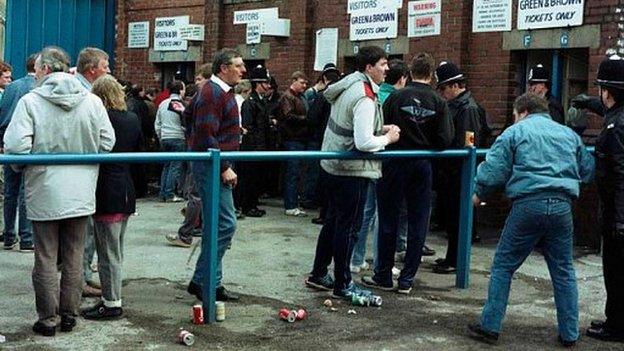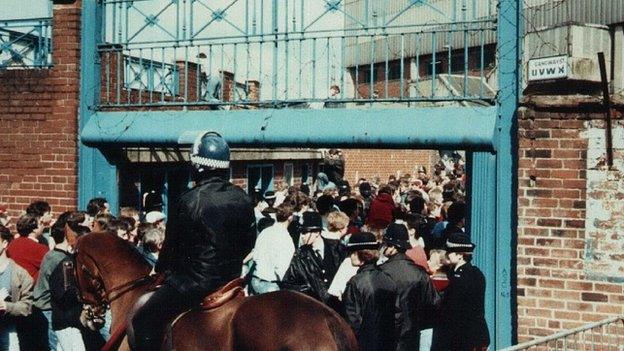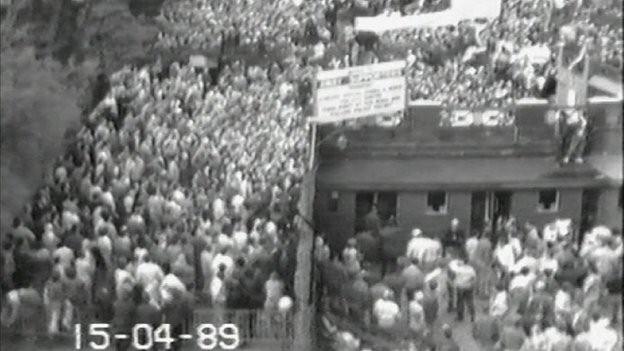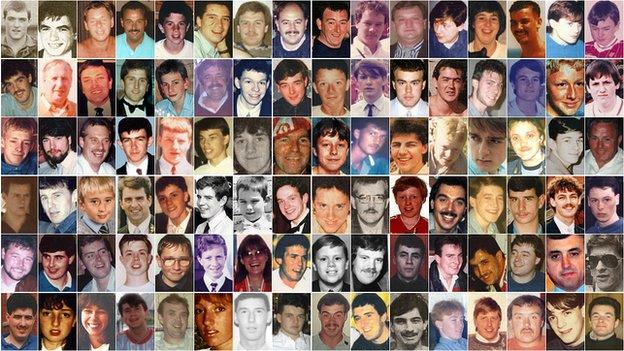Hillsborough Inquests: Turnstiles area was 'a death trap'
- Published

Gordon Sykes was involved with policing the area outside the turnstiles at Hillsborough
The area outside the Leppings Lane turnstiles at Hillsborough on the day of the disaster was a "death trap", according to a former police inspector.
Gordon Sykes said police had opened an exit gate at the turnstiles and blocked a tunnel leading to the central terraces "at least four times" in the decade before the disaster.
He told the inquests that before 1989, the police had "got away with it".
Mr Sykes later spoke of his experiences on the day, which were used by The Sun.
Ninety-six fans died as a result of a crush in the central pens of the terraces at the FA Cup semi-final between Liverpool and Nottingham Forest on 15 April 1989.
Fresh inquests into the deaths are being held in Warrington, Cheshire.
Mr Sykes told the jury how he was involved in policing football matches at Hillsborough throughout the 1980s.
They heard that in a police interview in February 2014, he had described the area outside the Leppings Lane turnstiles as a "death trap".

A gate was opened to allow fans in to the Leppings Lane end "at least four times" during the 1980s, the jury heard
Mr Sykes told court the layout of those turnstiles had previously caused problems and the access route outside the ground meant fans would get "trapped" in corners or against fences and gates.
"If it got so bad, I would radio through to the control room and explain what was happening and ask them to use the gate C - which is outside - to let people in."
He explained that at previous matches, after a request to open a gate was made, match control would ask the police inspector behind the turnstiles to block off the access to the tunnel leading to the terraces.
Asked about how the police had managed that area prior to the disaster, the former inspector said officers would try to "hold people back with cordons, horses, whatever facilities we had got to try to relieve the pressure".
"Up to 1989, I'm going to put it bluntly, we got away with it."
Mr Sykes said his views should have been well known to senior officers.

Before the 1989 disaster, police "had got away with it" when managing Hillsborough crowds, Mr Sykes said
He said he and other officers had shared their views on ground safety "many times" with match commanders.
"People were well aware what my feelings were and the feelings of fellow officers.
"The match commanders were obviously aware of it because they approved the opening of the gates."
He told the jury he had been not impressed by the newly appointed match commander Ch Supt David Duckenfield when he attended a briefing by him the day before the disaster.
"I knew him in that I knew who he were [sic], but I had never worked with him.
"I didn't know his background, his history. I sensed he were weak and probably didn't have a clear understanding of what a semi-final entailed.
"It was just my impression of the way that he put things over. I didn't think it were a briefing that inspired you, if I can say that."
The inquests continue.

Who were the 96 victims?

BBC News: Profiles of all those who died